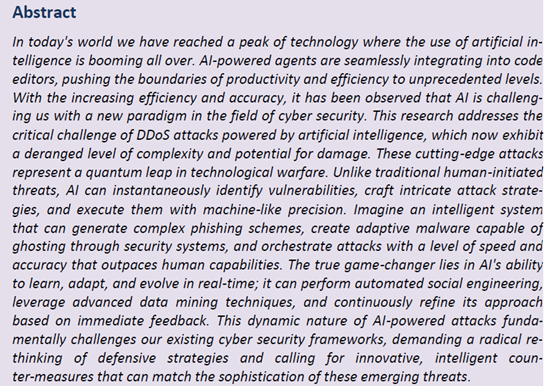DDoS Attack Using Artificial Intelligence

DOI:
https://doi.org/10.54060/a2zjournals.jase.106Keywords:
Artificial intelligence , DDoS attacks cybersecurity, ai-powered agents, automated social engineeringAbstract
In today's world we have reached a peak of technology where the use of artificial intelligence is booming all over. AI-powered agents are seamlessly integrating into code editors, pushing the boundaries of productivity and efficiency to unprecedented levels. With the increasing efficiency and accuracy, it has been observed that AI is challenging us with a new paradigm in the field of cyber security. This research addresses the critical challenge of DDoS attacks powered by artificial intelligence, which now exhibit a deranged level of complexity and potential for damage. These cutting-edge attacks represent a quantum leap in technological warfare. Unlike traditional human-initiated threats, AI can instantaneously identify vulnerabilities, craft intricate attack strategies, and execute them with machine-like precision. Imagine an intelligent system that can generate complex phishing schemes, create adaptive malware capable of ghosting through security systems, and orchestrate attacks with a level of speed and accuracy that outpaces human capabilities. The true game-changer lies in AI's ability to learn, adapt, and evolve in real-time; it can perform automated social engineering, leverage advanced data mining techniques, and continuously refine its approach based on immediate feedback. This dynamic nature of AI-powered attacks fundamentally challenges our existing cyber security frameworks, demanding a radical rethinking of defensive strategies and calling for innovative, intelligent counter-measures that can match the sophistication of these emerging threats.
Downloads
References
C.-S. Shieh, T.-T. Nguyen, W.-W. Lin, M.-F. Horng, T.-V. Nguyen, and D. Miu, “Generating adversarial DDoS attacks with CycleGAN architecture,” in 2022 International Conference on Computer Technologies (ICCTech),pp. 64-69, 2022, doi: 10.1109/ICCTech55650.2022.00018.
S. Ahmadi, AI in the Detection and Prevention of Distributed Denial of Service (DDoS) Attacks. 2024, doi: 10.2139/ssrn.5011038
Glăvan, “DDoS detection and prevention based on artificial intelligence techniques,” Sci. Bull. Nav. Acad., vol. XXII, no. 1, pp. 134–143, 2019. 10.21279/1454-864X-19-I1-018.
S. Singh, M. Gupta, and D. K. Sharma, “DDOS attack detection with machine learning: A systematic mapping of literature,” in 2023 5th International Conference on Smart Systems and Inventive Technology (ICSSIT), pp. 939-945, 2023, doi: 10.1109/ICSSIT55814.2023.10060897.
S. Alzahrani and L. Hong, “Detection of distributed denial of service (DDoS) attacks using artificial intelligence on cloud,” in 2018 IEEE World Congress on Services (SERVICES), pp. 35-36, 2018, doi: 10.1109/SERVICES.2018.00031.
B. S. Rawal, S. Patel, and M. Sathiyanarayanan, “Identifying DDoS attack using split-machine learning system in 5G and beyond networks,” in IEEE INFOCOM 2022 - IEEE Conference on Computer Communications Workshops (INFOCOM WKSHPS), pp. 1-6, 2022, doi: 10.1109/INFOCOMWKSHPS54753.2022.9798301.
S. Santhosh, M. Sambath, and J. Thangakumar, “Detection Of DDOS Attack using Machine Learning Models,” in 2023 International Conference on Networking and Communications (ICNWC), Chennai, India, pp. 1–6, 2023. doi: 10.1109/ICNWC57852.2023.10127537.
B. Zhang, T. Zhang, and Z. Yu, “DDoS detection and prevention based on artificial intelligence techniques,” in 2017 3rd IEEE International Conference on Computer and Communications (ICCC), pp. 1276-1280, 2017, doi: 10.1109/CompComm.2017.8322748.
A. Nafea, M. Hamdi, B. S. Abdulhakeem, A. T. Shakir, M. S. I. Alsumaidaie, and A. M. Shaban, “Detection Systems for Distributed Denial-of-Service (DDoS) Attack Based on Time Series: A Review,” in 2024 21st International Multi-Conference on Systems, Signals & Devices (SSD), Erbil, Iraq, pp. 43–48, 2024. doi: 10.1109/SSD61670.2024.10548796.
H. Muhammad Ismail Mohmand, U. Ayaz Ali Khan, and M. Ullah, “Aftab Ahmed, Mushtaq Raza, Izaz Ur Rahman and Muhammad Haleem. “A Machine Learning-Based Classification and Prediction Technique for DDoS Attacks,” IEEE Access, vol. 10, pp. 21443–21454, 2022.
A. I. Hassan, E. A. El Reheem, and S. K. Guirguis, “An entropy and machine learning based approach for DDoS attacks detection in software defined networks,” Sci. Rep., vol. 14, no. 1, p. 18159, 2024. 14. 10.1038/s41598-024-67984-w.
Y. Wei, J. Jang-Jaccard, A. Singh, F. Sabrina, and S. Camtepe, “Classification and explanation of distributed denial-of-service (DDoS) attack detection using machine learning and Shapley additive explanation (SHAP) methods,” arXiv [cs.CR], 2023. 10.48550/arXiv.2306.17190.
T. Kelley and E. Furey, “Getting Prepared for the Next Botnet Attack: Detecting Algorithmically Generated Domains in Botnet Command and Control,” in 29th Irish Signals and Systems Conference (ISSC), Belfast, UK, pp. 1–6, 2018. doi: 10.1109/ISSC.2018.8585344.
T. Chakraborty, S. Mitra, and S. Mittal, “CAPoW: Context-aware AI-assisted proof of work based DDoS defense,” arXiv [cs.CR], 2023, 10.48550/arXiv.2301.11767

Downloads
Published
How to Cite
CITATION COUNT
Issue
Section
License
Copyright (c) 2025 Lalit Kumar Gupta, Utkarsh Tripathi, Priyanka Pande, Akriti Singh

This work is licensed under a Creative Commons Attribution 4.0 International License.



























